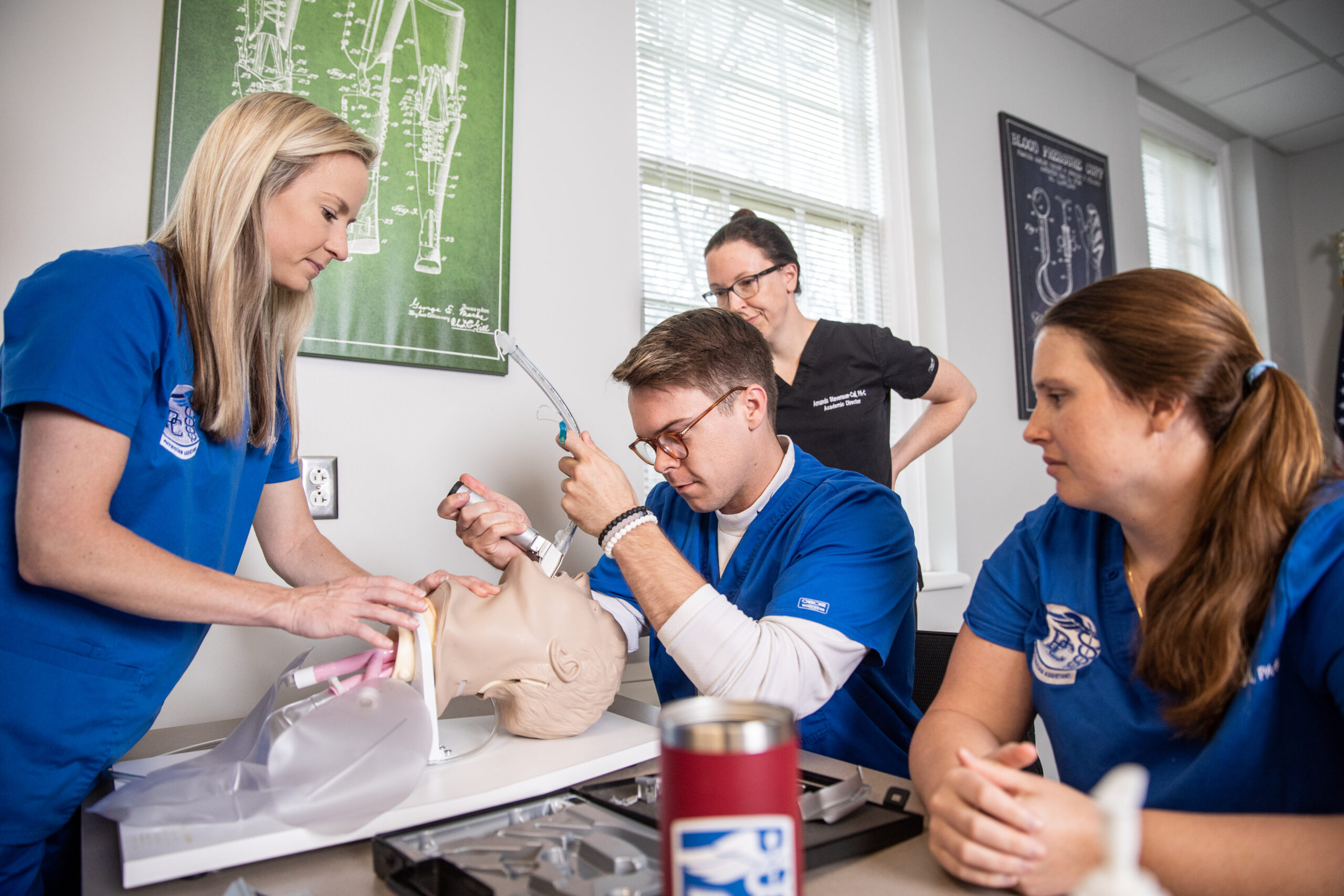A Message from the Program Director

Welcome to Presbyterian College and the Physician Assistant Studies Program.
I invite you to explore the transformative journey that awaits you at Presbyterian College’s Physician Assistant Studies Program. As you consider your path forward in healthcare, you’re joining a profession that truly represents the perfect intersection of meaningful patient care, professional growth, and personal fulfillment.
You probably already know the stats: The healthcare landscape is experiencing unprecedented demand for physician assistants. The Bureau of Labor Statistics is projecting a 31% growth rate through 2030, far outpacing the average for all occupations. This surge reflects critical healthcare needs: provider shortages in rural and underserved communities, an aging population requiring more complex care, and a healthcare system seeking cost-effective, quality-focused solutions.
In this environment, PAs consistently rank #1 in job satisfaction surveys. Time and time again, PA’s find fulfillment in their ability to make meaningful differences in patients’ lives across virtually every medical specialty.
Presbyterian College offers a distinctive pathway into this rewarding profession that’s built on our 140-year legacy of academic excellence and service-oriented education. Our motto, Dum Vivimus Servimus—”While We Live, We Serve”—isn’t just inscribed on buildings; it’s the foundation of everything we do. This commitment to service perfectly aligns with the PA profession’s core values and prepares our students not just to practice medicine, but to transform healthcare delivery in their communities.
Our PA program actively seeks students from a wide range of backgrounds, experiences, and perspectives. By fostering a learning community that reflects the patients we serve, we prepare future PAs to deliver more culturally responsive, empathetic, and effective care.
What sets PC apart is our intentionally small class sizes and dedicated faculty who are active practitioners bringing real-world experience directly to our students. Unlike programs where instruction is outsourced to teaching assistants or online platforms, our expert faculty teach every course, fostering meaningful mentorship relationships. We leverage cutting-edge technology to enhance learning while maintaining the irreplaceable human connection at the heart of medical education.
I look forward to personally welcoming you to our PC family.
With Warmest Regards,
Amanda Stevenson-Cali
Program Director
Mission
The mission of the Presbyterian College Physician Assistant Studies Program is to develop the medical, mental, moral, and physical capacities of each student in preparation for a lifetime of service to patients and those in need.
To fulfill this mission, our top priority is fostering an environment that empowers faculty, students, and practitioners to learn, grow, and expand their knowledge, skills, and attitudes necessary to meet the evolving healthcare needs of the communities they serve.
Vision
Our vision is to be a national leader in physician assistant education, scholarship, and service. Our faculty and graduates will be recognized as servant leaders in their communities.
Value
At Presbyterian College, our Physician Assistant Program upholds the highest standards of education, service, and integrity. We are dedicated to providing a quality education that fosters clinical excellence and lifelong learning. Rooted in a culture of service, we prepare students to lead with compassion and a commitment to improving patient care. Through scholarship, integrity, and teamwork, we develop future PAs who are not only skilled healthcare providers but also ethical leaders dedicated to making a lasting impact in their communities.

Program Goals & Metrics
- Goal 1: The program will maintain a level of PANCE (Physician Assistant National Certifying Exam) pass rates above the national average.
- Goal 2: The program will maintain a 90% or better graduation rate for entering PA program students.
- Class 2021 = 100% Graduation Rate
- Class of 2022 = 97% Graduation Rate
- Class of 2023 = 97% Graduation Rate
- Class of 2024 = 86% Graduation Rate
- Attrition information
- Goal 3: The deceleration rates for PA program students will be 10% or less for academic reasons.
- Class of 2021 = 0% Deceleration Rate
- Class of 2022 = 0% Deceleration Rate
- Class of 2023 = 0% Deceleration Rate
- Class of 2024 = 0% Deceleration rate
- Goal 4: Among those actively seeking employment, the employment rate for graduates of the PA program will be 90% or greater twelve months after graduation.
- Class of 2021 = 96% Employment for those passing the PANCE
- Class of 2022 = 100% Employment for those passing the PANCE
- Class of 2023 = 100% Employment for those passing the PANCE
- Goal 5: Through its student society, foster service and leadership in the community and the profession.
- See Below for PA Outreach Projects
- Good Shepherd Free Clinic – collection and donation of dental hygiene products
- YMCA Clinton -Assist with Health & Wellness Screenings.
- Valentine’s Day cards to St. Jude patients
- Jude Children’s Hospital specializes in research, cures, and prevention of pediatric catastrophic diseases. Since the patients at St. Jude were unable to participate in typical Valentine’s Day celebrations with their classmates, we worked to ensure that they still felt loved and appreciated. We each wrote several Valentine’s Day cards that were delivered to patients at St. Jude. This was available through St. Jude’s website and all cards were sent virtually.
- Hospice of Laurens County – Students collected snack donations for families visiting loved ones at this location.
- Humane Society of Laurens County – Student volunteer hours.
- Geraldine’s Soup Kitchen -Students volunteer with food preparation and service.
- Clinton Nursing Home -Students make Valentine’s cards for all the residents.
- MUSC – Easter encouragement messages.
- To make Easter in the hospital feel more like home, we wrote encouraging messages to patients at MUSC that were printed and placed in Easter eggs for an egg hunt throughout the hospital. This was available through MUSC’s website.
- 3.2 for 32 Virginia Tech Remembrance Walk
- Walked/ran 3.2 miles in remembrance of the 32 lives lost in the Virginia Tech shooting on April 16th, 2007.
- American Red Cross -Blood Drive
- The American Red Cross set up a donation truck on campus encouraging faculty, staff, and students to donate blood.
- Ronald McDonald House Charities – Needs Drive
- The Ronald McDonald House is a nonprofit organization that assists families who have loved ones seeking medical care by providing more than 2.5 million overnight stays each year, meals, and daily necessities. This helps families save over $930 million in hotel and meal expenses. We donated 4 large boxes of needed items to RMH in Greenville and collected pop tops.
- Murph Challenge for Memorial Day
- The Murph Challenge is named after Michael Murphy, a Navy Lieutenant who was killed in action in Afghanistan. Murphy was awarded the Congressional Medal of Honor for courage and sacrifice. This workout is a symbolic gesture of respect for the fallen soldiers, and service men and women who risk their lives to defend our freedom.
- St. Luke Free Clinic
- Students volunteered at St. Luke Free Medical Clinic in Spartanburg, SC where they assisted in providing medical care to the underserved community.
- United Way of Laurens 2nd Annual Bookbag Giveaway
- Students collected much-needed school supplies to help fill backpacks for children in Laurens County with the United Way of Laurens. The child had to be present to receive a backpack. In addition, students created flyers on Pediatric Health Education (Respiratory Infections and Prevention, Smoking in Teens, Head Trauma, Voiding/Potty training, Diet for Children, and Eye Development) to pass out to parents.
- Women’s Health Month – Period products drive. (May)
- Teacher Appreciation Day -Teaching Supplies are collected and donated to local schools.
- SC Empowerment Center Youth Food and Hygiene Supply Drive
- Donation collection of food and other products as a part of the Christmas Drive
The PC PA Program guides students through the acquisition of key program competencies. These competencies represent the knowledge, interpersonal, clinical, and technical skills, professional behaviors, and clinical reasoning and problem-solving abilities required for graduation and entry into PA practice.
The PC PA Program Competencies were adapted from the “Competencies of the Physician Assistant Profession” (2012), the PAEA’s Core Tasks and Objectives, the PAEA Core Competencies for New Physician Graduates (2018), the ARC-PA Standards of Accreditation (2018), the AAMC’s Core Entrustable Professional Activities for Entering Residency, and the NCCPA Exam Content Blueprint to fit within the mission of PC PA Program.
The Faculty for the PC PA Program, along with the approval of the Academic, Clinical, and Steering Committees, have reviewed and approved these Program Competencies. This process ensures that the curriculum and assessments are aligned and that the Program Competencies represent the most current standards of medical education, medical care, and student acquisition of learning.
Students will be prepared for certification and clinical practice by demonstrating competency in each of the Program Competencies. Upon completion the program, graduating PA students will complete the defined competencies below.
| Competency Domain | Program Competencies (Learning Outcomes for New Graduates) | ARC 5th ed | Evaluation within the final four months |
|---|---|---|---|
| Clinical and Technical Skills | CTS1: Adapt approach to patient care based on the acute, chronic, preventative, or emergent setting (Clinical Medicine I, II, III, SCPE’s) CTS2: Adapt approach to patient care based on differences in age across the lifespan (Clinical Medicine III; Patient Evaluation and Counseling III; Pharmacology III, Clinical Laboratory and Diagnostic Medicine III, SCPE’s) CTS3: Elicit medical histories, perform physical examinations, and develop patient-centered management plans (Patient Evaluation and Counseling I, II, III, SCPE’s) CTS4: Perform common technical skills and procedures in a safe and effective manner (Patient Evaluation and Counseling I, II, III, SCPE’s) CTS5: Evaluate clinical situations that require referral or consultation (Clinical Medicine I, II, III, SCPE’s) | B2.08a B2.02d B2.07 B2.12 B2.09 B3.03 | CTSI: OSCE CTS2: OSCE CTS3: OSCE CTS4: practical exam (summative) CTS5: OSCE, multiple choice exam |
| Clinical Reasoning & Problem Solving | CP1: Locate, appraise, and integrate evidence from scientific studies to improve the care of patients (Research Methods and Evidence Based Medicine, SCPE’s) CP2: Apply scientific principles to diagnostic and therapeutic clinical decision-making (Clinical Medicine I, II, III, SCPE’s) CP3: Discern normal and abnormal health states, and develop plans to follow patients’ conditions in an appropriate longitudinal manner (Clinical Medicine I, II, III, SCPE’s) | B2.08a B2.13 B2.05 B2.07 | CP1: PICO paper CP2: multiple choice exam CP3: OSE, multiple choice exam |
| Interpersonal (IP) | IP1: Utilize communications skills for the effective exchange of information with patients and their families (Patient Evaluation and Counseling I, II, III, SCPE’s) IP2: Apply principles of interprofessional practice to work in collaborative health care teams (Introduction to the PA Profession, Clinical Medicine I, Patient Evaluation and Counseling II, Pharmacology III, SCPE’s) IP3: Utilize compassion and understanding when discussing sensitive topics with patients and their families (Introduction to the PA Profession, SCPE’s) IP4: Value the diversity of patients, avoid stereotyping, and recognize that patients’ health benefits can affect communication, decision-making, adherence, and health outcomes (Public Health and Disease Prevention, SCPE’s IP5: Compose accurate and thorough documentation of patient encounters (Patient Evaluation and Counseling I, II, III, SCPE’s) | B2.04 B2.10 B2.06 B2.11c B2.14 | IP1: OSCE IP2: IP3: pratical exam (summative) IP4: practical exam (summative) IP5: SOAP notes |
| Medical Knowledge (K) | K1: Apply the basic concepts of medical science to the clinical evaluation and management of patients (Clinical Medicine I, II, III, SCPE’s) K2: Distinguish signs and symptoms of common medical and surgical conditions (Clinical Medicine I, II, III, SCPE’s) K3: Select and interpret appropriate routine laboratory and diagnostic tests, including appropriate preventative screening (Clinical Laboratory and Diagnostic Medicine I, II, III, SCPE’s) K4: Formulate differential diagnoses based on historical, physical exam, and diagnostic information (Clinical Medicine I, II, III, SCPE’s) K5: Implement appropriate pharmacologic and nonpharmacologic clinical management strategies for the care of common patient conditions (Pharmacology I, II, III, SCPE’s) K6: Provide patient-centered education that addresses lifestyle modification, treatment compliance, and patient coping (Patient Evaluation and Counseling I, II, III, SCPE’s) | B1.o1c B2.02a-e B2.03 B2.07 B2.12 | K1: OSCE, multiple choice exam K2: OSCE, multiple choice exam K3: OSCE, multiple choice exam K4: OSEC K5: multiple choice exam K6: OSCE |
| Professional Behaviors (PB) | PB1: Demonstrate a commitment to excellence and an on-going professional development (Introduction to the PA Profession, SCPE’s) PB2: Demonstrate the principles of honesty, integrity, accountability, and respect, and abide by ethical and professional standards (Biomedical Ethics, Clinical Summative) PB3: Demonstrate respect for patient privacy by maintaining confidentiality (Introduction to the PA Profession, Biomedical Ethics, Clinical Summative) PB4: Demonstrate knowledge of the PA profession, its development and trends, and the laws and regulations governing professional practice (Clinical Summative) PB5: Identify gaps in any medical knowledge or skills and respond positively to criticism or feedback (SCPE’s) | B2.19 B2.17 B2.18 | PB1: Preceptor Evaluation of the Student PB2: Professionalism, Ethics, and Confidentiality Assignment PB3: Professionalism, Ethics, and Confidentiality Assignment PB4: PA Profession & Laws Assignment PB5: Preceptor Evaluation of the Student |
Accreditation
The Accreditation Review Commission on Education for the Physician Assistant, Inc. (ARC-PA) has granted Accreditation-Continued status to the Presbyterian College Physician Assistant Studies Program sponsored by Presbyterian College. Accreditation-Continued is an accreditation status granted when a currently accredited program is in compliance with the ARC-PA Standards.
Accreditation remains in effect until the program closes or withdraws from the accreditation process or until accreditation is withdrawn for failure to comply with the Standards. The approximate date for the next validation review of the program by the ARC-PA will be September 2033. The review date is contingent upon continued compliance with the Accreditation Standards and ARC-PA policy.
The program’s accreditation history can be viewed on the ARC-PA website.
Presbyterian College is accredited by the Southern Association of Colleges and Schools Commission on Colleges (SACSCOC) to award baccalaureate, masters, and doctorate degrees. Presbyterian College also may offer credentials such as certificates and diplomas at approved degree levels.
Questions about the accreditation of Presbyterian College may be directed in writing to the Southern Association of Colleges and Schools Commission on Colleges at 1866 Southern Lane, Decatur, GA 30033-4097, by calling (404) 679-4500, or by using information available on SACSCOC’s website (www.sacscoc.org).









